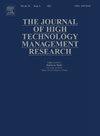The effect of leadership empowerment on technology transfer effectiveness: A proposed model: An applied study on the telecommunication companies in one of the developing countries
Abstract
Our research study analyzes the effect of leadership empowerment dimensions on technology transfer effectiveness considering the knowledge transfer among the technology transfer effectiveness metrics. This study had been applied on the telecommunication sector which is a rapidly growing sector in Egypt. Egypt is one of the first countries that developed a well-structured infrastructure in this industry which increased its competitiveness in this sector in the Middle East. A lot of scholars had not considered either the knowledge transfer process as part of the metrics of technology transfer or clarified how leadership empowerment affects technology transfer effectiveness in the developing countries. Moreover, the impact of leadership empowerment on each dimension of the technology transfer had not been clarified yet. Based on the review of the previous literature, the research hypotheses were drawn. The initial sample consisted of 1200 participants. The researcher received response from 800 participants with a response rate 66.67%. Findings revealed positive and significant relationships between leadership empowerment as a high order construct and each dimension of technology transfer effectiveness (product and process perforance, business performance and human resources capability). The findings also clarified that coaching employees has the greatest effect on technology transfer effectiveness while monitoring employees has the lowest effect on technology transfer effectiveness. It's suggested that future research may be extended to other sectors and domains within Egypt.

 求助内容:
求助内容: 应助结果提醒方式:
应助结果提醒方式:


